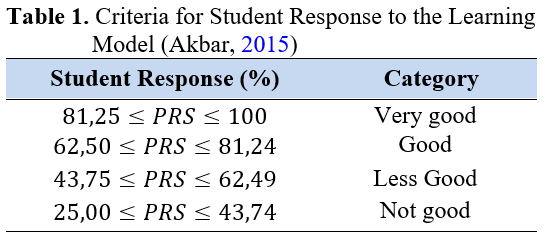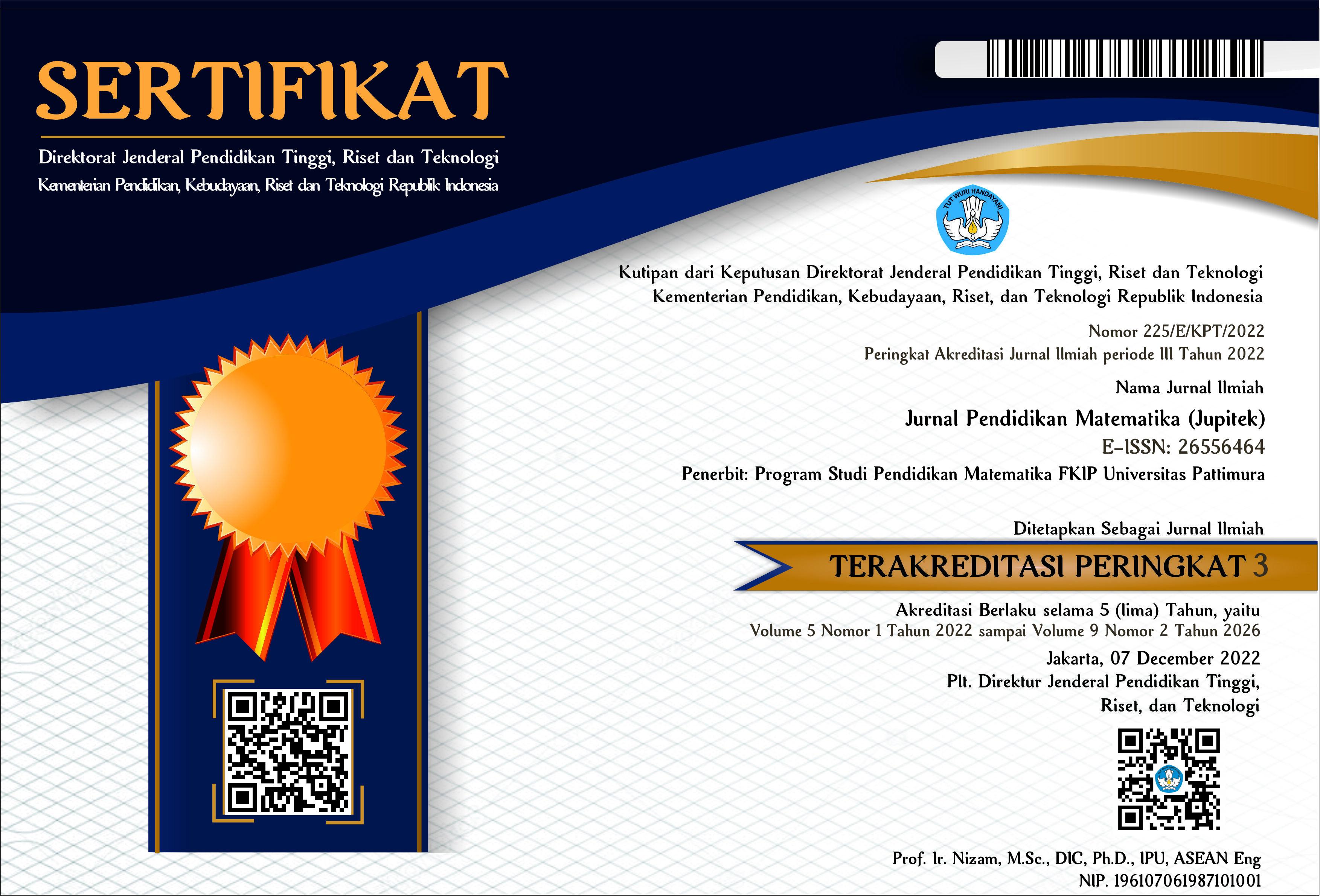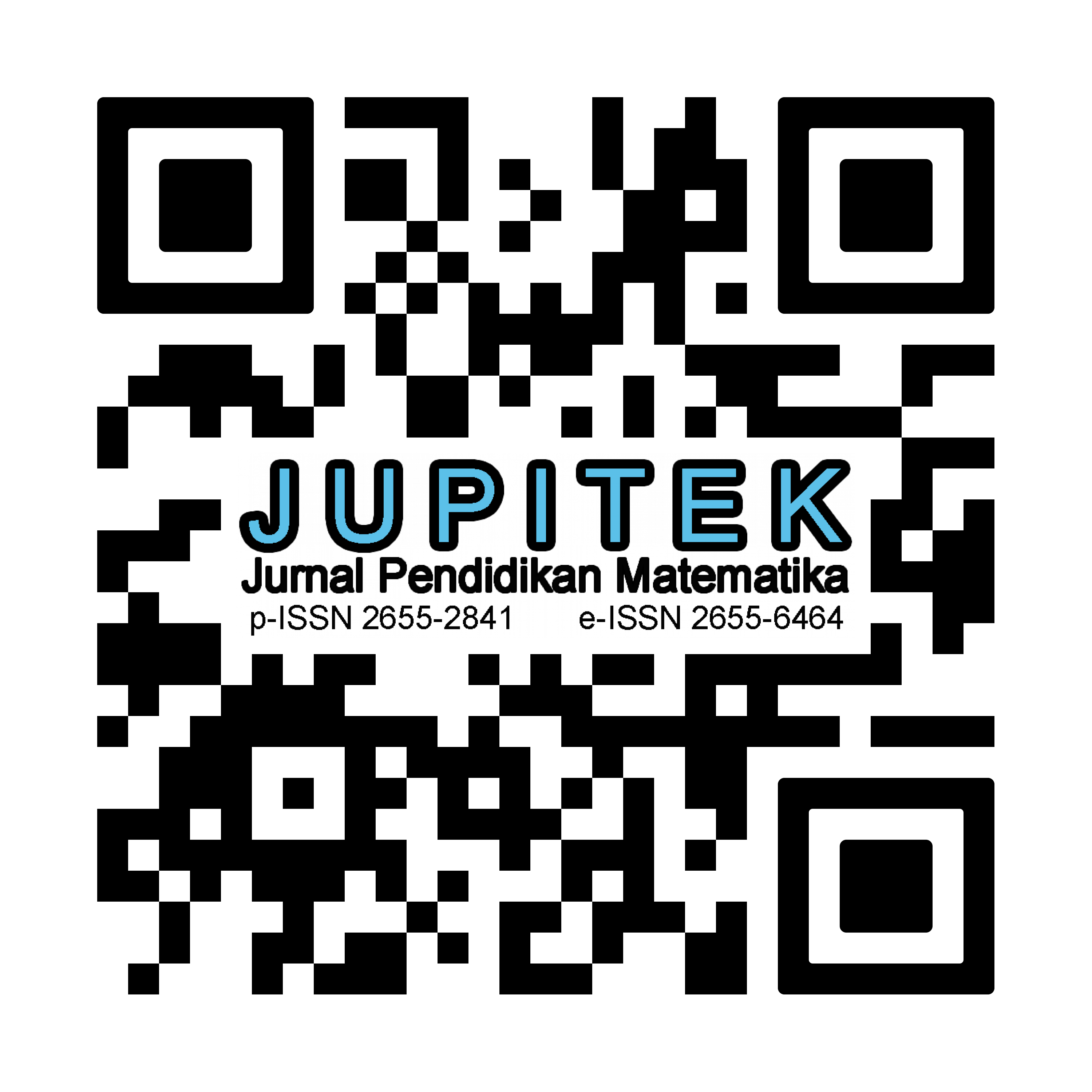ANALYSIS OF STUDENT RESPONSE TO THE IMPLEMENTATION OF THE ETHNO-FLIPPED CLASSROOM MODEL ASSISTED BY COLLABORATIVE CLOUD CLASSROOM
Abstract
The ethno-flipped classroom model is a collaborative and student-centered learning model developed by integrating the flipped learning model and the ethnomathematics approach. The implementation of the ethno-flipped classroom model is assisted by Collaborative Cloud Classroom which was developed as a Learning Management System during the implementation of learning. The purpose of this study was to determine student responses to the application of the ethno-flipped classroom model assisted by Collaborative Cloud Classroom for high school students in Gunungsitoli City, Nias Island, North Sumatra Province. This research is descriptive quantitative research with data collection techniques using Likert-scale questionnaires in Small Group and Field Test. The research sample was Gunungsitoli City High School students, namely 25 students in the small group stage and 222 students in the filed test stage. The results showed that 83% of students gave a very good response at the small group stage and 85% of students gave a very good response to the application of the model at the filed test stage. The achievement of the percentage of student responses concluded that the ethno-flipped classroom model assisted by Collaborative Cloud Classroom can be further implemented in the application of other cultural contexts in future research
Downloads
References
Akbar, S. (2015). Instrumen Perangkat Pembelajaran. Remaja Rosdakarya.
Akkaraju, S. (2016). The role of flipped learning in managing the cognitive load of a threshold concept in physiology. The Journal of Effective Teaching, 16(3), 28–43.
Akker, J. Van Den, Gravemeijer, K., McKenney, S., & Nieveen, N. (2006). Introducing educational design research. In J. Van Den Akker, K. Gravemeijer, S. McKenney, & N. Nieveen (Eds.), Educational Design Research (4 Edition). Routledge.
Attard, C., & Holmes, K. (2020a). An exploration of teacher and student perceptions of blended learning in four secondary mathematics classrooms. Mathematics Education Research Journal , 1–22. https://doi.org/10.1007/S13394-020-00359-2
Attard, C., & Holmes, K. (2020b). An exploration of teacher and student perceptions of blended learning in four secondary mathematics classrooms. Mathematics Education Research Journal, 1–22. https://doi.org/10.1007/s13394-020-00359-2
Bergmann, J., & Sams, A. (2012). Flip your classroom: Reach every student in every class every day. International Society for Technology in Education.
Bronfenbrenner, U. (1986). Ecology of the family as a context for human development: Research perspectives. Developmental Psychology, 22(6), 723–742.
D’Ambrosio, U., & Rosa, M. (2017). Ethnomathematics and Its Pedagogical Action in Mathematics Education. 285–305. https://doi.org/10.1007/978-3-319-59220-6_12
Deci, E., & Ryan, R. (2008). Self-determination theory: A macrotheory of human motivation, development, and health. Canadian Psychology, 49(3), 182–185.
Felder, R. M. (2012). Engineering education–A Tale of Two Paradigms. SFGE, 2nd. Int Conf on Geotechnical Engineering Education, Galway.
Fernández-Martín, F.-D., Romero-Rodríguez, J.-M., Gómez-García, G., & Navas-Parejo, M. R. (2020). Impact of the flipped classroom method in the mathematical area: A systematic review. Mathematics, 8(2162), 1–11. https://doi.org/10.3390/math8122162
Gao, J., Deng, W., Hao, L., Crabbe, M. J. C., Manta, O., & Duarte, N. (2021). Optimization Analysis and Implementation of Online Wisdom Teaching Mode in Cloud Classroom Based on Data Mining and Processing. International Journal of Emerging Technologies in Learning (IJET), 16(01), 205–218. https://doi.org/10.3991/IJET.V16I01.18233
Hill, R., Adem, Ç., Alangui, W. V, Molnár, Z., Aumeeruddy-Thomas, Y., Bridgewater, P., Tengö, M., Thaman, R., Yao, C. Y. A., Berkes, F., Carino, J., Cunha, M. C. da, Diaw, M. C., Díaz, S., Figueroa, V. E., Fisher, J., Hardison, P., Ichikawa, K., Kariuki, P., … Xue, D. (2020). Working with Indigenous, local and scientific knowledge in assessments of nature and nature’s linkages with people. Current Opinion in Environmental Sustainability, 43, 8–20. https://doi.org/10.1016/j.cosust.2019.12.006
Joyce, B., & Weil, M. (2003). Models of Teaching (Fifth Edit). Prentice Hall of India.
Ko, J., Sammons, P., & Bakkum, L. (2016). Effective Teaching. Education Development Trust.
Loyens, S. M. M., & Gijbels, D. (2008). Understanding the effects of constructivist learning environments: introducing a multi-directional approach. Instructional Science , 36(5), 351–357. https://doi.org/10.1007/S11251-008-9059-4
Mattis, K. V. (2014). Flipped classroom versus traditional textbook instruction: Assessing accuracy and mental effort at different levels of mathematical complexity. Technology, Knowledge and Learning, 20(2), 231–248. https://doi.org/10.1007/S10758-014-9238-0
Muir, T. (2021). Self-determination theory and the flipped classroom: a case study of a senior secondary mathematics class. Mathematics Education Research Journal, 33(3), 569–587. https://doi.org/10.1007/s13394-020-00320-3
Polman, J., Hornstra, L., & Volman, M. (2021). The meaning of meaningful learning in mathematics in upper-primary education. Learning Environments Research, 24(3), 469–486. https://doi.org/10.1007/S10984-020-09337-8/FIGURES/1
Prahmana, R. C. I., Yunianto, W., Rosa, M., & Orey, D. C. (2021). Ethnomathematics: Pranatamangsa system and the birth-death ceremonial in yogyakarta. Journal on Mathematics Education, 12(1), 93–112. https://doi.org/10.22342/JME.12.1.11745.93-112
Ramadhani, R. (2020). Desain pembelajaran matematika berbasis TIK: Konsep dan penerapan [ICT-based mathematics learning design: Concepts and applications] (J. Simarmata (ed.)). Yayasan Kita Menulis.
Ramadhani, R., & Fitri, Y. (2020). A Project-based learning into flipped classroom for ePUB3 electronic mathematics learning module (eMLM)-based on course design and implementation. Universal Journal of Educational Research, 8(7), 3119–3135. https://doi.org/10.13189/ujer.2020.080740
Ramadhani, R., Syahputra, E., & Simamora, E. (2021). Ethno-flipped classroom model: Sebuah rekomendasi model pembelajaran matematika di masa new normal [Ethno-flipped classroom model: A recommendation for mathematics learning model in the new normal]. AXIOM: Jurnal Pendidikan Dan Matematika, 10(2), 221–240. https://doi.org/10.30821/axiom.v10i2.10331
Ramadhani, R., Syahputra, E., Simamora, E., & Meizar, A. (2022). Design of collaborative cloud classroom (CCCR) for ethno-flipped classroom teaching model. 2022 4th International Conference on Cybernetics and Intelligent System (ICORIS), 1–5. https://doi.org/10.1109/ICORIS56080.2022.10031557
Ramadhani, R., Umam, R., Abdurrahman, A., & Syazali, M. (2019). The effect of flipped-problem based learning model integrated with LMS-google classroom for senior high school students. Journal for the Education of Gifted Young Scientists, 7(2), 137–158. https://doi.org/10.17478/jegys.548350
Risdiyanti, I., & Prahmana, R. C. I. (2018). Ethnomathematics: Exploration in Javanese culture. Journal of Physics: Conference Series, 943, 12032. https://doi.org/10.1088/1742-6596/943/1/012032
Rosa, M., & Orey, D. C. (2016). State of the art in ethnomathematics. In Current and Future Perspectives of Ethnomathematics as a Program (pp. 11–37). Springer, Cham. https://doi.org/10.1007/978-3-319-30120-4_3
Seery, M. K., & Donnelly, R. (2012). The implementation of pre-lecture resources to reduce in-class cognitive load: A case study for higher education chemistry. British Journal of Educational Technology, 43(4), 667–677. https://doi.org/10.1111/J.1467-8535.2011.01237.X
Turan, Z., & Goktas, Y. (2016). The Flipped Classroom: Instructional efficency and impact of achievement and cognitive load levels,. Journal of E-Learning and Knowledge Society, 12(4), 51–62. https://doi.org/10.20368/1971-8829/1122
Vallori, A. B. (2014). Meaningful learning in practice. Journal of Education and Human Development, 3(4), 199–209. https://doi.org/10.15640/jehd.v3n4a18
Vygotsky, L. S. (1978). Mind in society: The development of higher pychological processes. Harvard University Press.
Zidny, R., Sjöström, J., & Eilks, I. (2020). A multi-perspective reflection on how indigenous knowledge and related ideas can improve science education for sustainability. Science & Education, 29, 145–185. https://doi.org/10.1007/s11191-019-00100-x.

Copyright (c) 2023 Rahmi Ramadhani, E. Elvis Napitupulu, Pardomuan Sitompul

This work is licensed under a Creative Commons Attribution-NonCommercial-ShareAlike 4.0 International License.
License and Copyright Agreement
By submitting a manuscript to Jurnal Pendidikan Matematika (JUPITEK), the author(s) certify and agree to the following terms:
- Originality and Authority: The submitting author is authorized by all co-authors to enter into this agreement. The manuscript describes original work that has not been published previously in a peer-reviewed journal, nor is it under consideration for publication elsewhere.
- Approval: Its publication has been approved by all author(s) and by the responsible authorities of the institutions where the work was carried out.
- Rights: The authors secure the right to reproduce any material that has already been published or copyrighted elsewhere.
- Licensing and Copyright: Authors retain the copyright to their work.
- License Grant: The authors grant Jurnal Pendidikan Matematika (JUPITEK) the right of first publication, with the work simultaneously licensed under the Creative Commons Attribution-NonCommercial-ShareAlike 4.0 International (CC BY-NC-SA 4.0).
- Self-Archiving: Authors are permitted and encouraged to deposit the published version of their article in institutional repositories, on their personal websites, and other academic platforms, with proper acknowledgment of its initial publication in Jurnal Pendidikan Matematika (JUPITEK).





.png)


